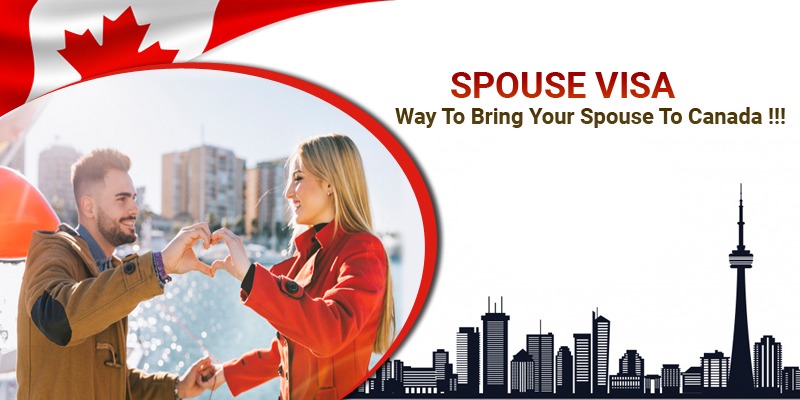
 Immigration
Immigration
Navigating the intricacies of Canada spousal sponsorship can be both exciting and daunting. Whether you’re considering inland spousal sponsorship Canada or exploring the differences between inland vs outland sponsorship Canada, this comprehensive guide aims to provide clarity.
From understanding the spousal sponsorship Canada checklist to tracking your spousal sponsorship status and estimating Canada spouse processing time, we’ll cover it all. Let’s delve into the essential details to ensure a smooth and informed journey through the process.
Whether contemplating inland spousal sponsorship in Canada or weighing the distinctions in inland vs outland sponsorship Canada, this comprehensive guide aims to alleviate uncertainties. From comprehending the spousal sponsorship Canada checklist to monitoring your spousal sponsorship status and gauging Canada spouse processing time, our goal is to provide a thorough understanding.

Canada spousal sponsorship is a pivotal initiative facilitating the reunion of Canadian citizens and permanent residents with their spouses or common-law partners. This program, serving as a crucial aspect of family reunification in Canada, allows loved ones to join and establish a life together in the country. Whether opting for the convenience of inland spousal sponsorship Canada or the flexibility of outland sponsorship, understanding the spousal sponsorship Canada checklist is fundamental.
This comprehensive checklist ensures a streamlined application process, contributing to a more efficient and successful family reunification journey. Keeping a close eye on the spousal sponsorship status and managing expectations regarding Canada spouse processing time are integral to a positive experience throughout the application process.
Read more: Canada visa rejection reasons
When initiating the spousal sponsorship process, one crucial decision is whether to opt for inland spousal sponsorship Canada or choose the outland sponsorship route.

Spousal Sponsorship, conjugal partner, or common-law partner in Canada is a possibility for Canadian citizens or permanent residents who meet certain conditions. The Canadian government recognizes the importance of family reunification and offers two streams for sponsorship: the Spouse or Common-Law Partner in Canada Class (Inland) and the Family Class (Outland) Sponsorship Class.
Each stream has its own set of requirements and advantages. However, the basic financial obligation of the sponsor remains in effect for three years, regardless of the type of sponsorship chosen. In this article, we will explore the eligibility criteria, application process, and fees associated with sponsoring a partner in Canada. We will also discuss the medical inadmissibility criteria and how they may affect the sponsorship application.
Read more: Canada spouse open work permit
Key documents are essential for a smooth spousal sponsorship Canada application process, whether opting for inland spousal sponsorship Canada or outland sponsorship. Begin with proof of relationship, such as marriage certificates or joint assets, adhering to the spousal sponsorship Canada checklist.
Proof of Relationship: Include marriage certificates, photos, joint bank statements, or other documents establishing a genuine relationship.
Financial Support Documents: Demonstrate the ability to financially support the sponsored spouse by providing tax returns, pay stubs, and employment verification.
Identity and Civil Status Documents: Submit copies of passports, birth certificates, and any divorce or marriage dissolution papers.
Completed Application Forms: Accurately fill out the required forms, such as the IMM 1344 sponsorship form and IMM 0008 generic application form.
Language Proficiency: If applicable, provide language test results, demonstrating proficiency in English or French.
Medical Examination: Undergo a medical examination by an approved panel physician to ensure good health.
Police Clearance: Include police clearance certificates from all locations where the sponsored spouse has lived for six months or longer since the age of 18.
By meticulously preparing the spousal sponsorship Canada checklist, applicants can expedite the processing of their application and minimize potential delays. Submitting these documents promptly contributes to a streamlined process, minimizing delays in spousal sponsorship status updates and reducing Canada spouse processing time uncertainties.
Read more: work permit for students in Canada
Staying informed about your spousal sponsorship status is crucial for peace of mind during the Canada spousal sponsorship journey. Utilize the online tools provided by Immigration, Refugees, and Citizenship Canada (IRCC) to track the progress of your application. Regularly check for updates and respond promptly to any requests for additional information to ensure a smooth and efficient process.
This proactive approach not only ensures a smooth and efficient process but also aligns with the overall objective of reducing Canada spouse processing time uncertainties. Stay engaged throughout to enhance the chances of a positive outcome in your inland vs outland sponsorship Canada experience.
The processing time for a spouse visa application according to the IRCC is approximately 12 months from start to finish, but it can take longer depending on the nature of the case. If there are complications or the visa office requires additional proof of the relationship, the processing of the case will be delayed. It is best to ensure that the spouse sponsorship Canada application is done right the first time to ensure it is processed as quickly as possible.
The Canada spouse processing time can vary based on factors such as the type of spouse sponsorship Canada, the completeness of the application, and the volume of applications being processed. While some cases may be resolved within a few months, others may take a year or more. It’s crucial to manage expectations and be patient throughout the process.
The Canada spouse processing time is a crucial aspect of the spousal sponsorship journey, influencing the overall experience for couples navigating the immigration process. The duration it takes to complete the sponsorship application and receive a decision can vary based on several factors.

Factors influencing Canada spouse processing time include:
Application Type: Whether it’s an inland or outland spousal sponsorship Canada, the processing time can differ significantly. Inland applications often involve shorter wait times as the sponsored spouse is already in Canada.
Completeness of Application: A meticulously prepared and complete application, adhering to the spousal sponsorship Canada checklist, contributes to a more efficient process.
Volume of Applications: The workload at immigration offices can impact processing times. High volumes may lead to longer wait times.
Adherence to Requirements: Complying with all requirements, providing accurate information, and promptly responding to any requests for additional documentation can expedite the process.
The requirements for a spouse visa include being at least 18 years old, living in Canada or planning to return to Canada once the spouse or partner becomes a permanent resident, and being able and willing to provide for the basic financial needs of the partner for three years. The spouse sponsorship Canada can be done under the Spouse or Common-Law Partner in Canada Class (Inland) or the Family Class (Outland) Sponsorship Class.
Under the Spouse or Common-Law Partner in Canada Class (Inland), the sponsor lives with the partner in Canada, holds valid immigration status, and wishes to apply for an open work permit while the application is being processed. This stream is also open to those whose partner is out of status in Canada, but they are protected under a public policy that allows them to remain in Canada until the application is fully processed. However, the applicant should refrain from travelling outside of Canada while the application is being processed.
Read more: parents visa Canada
On the other hand, the Family Class (Outland) sponsorship option is for those whose partner lives outside of Canada, but the sponsor is currently living in Canada and does not plan to stay in Canada for the duration of the application process. The downside of this stream is that until the application is approved, living with the partner may be difficult. However, the partner can apply for a temporary visa to come to Canada while their outland sponsorship application is being processed.

The government processing fees for sponsoring a partner are $75 for the sponsorship fee, $475 for the principal applicant processing fee, $500 for the right of permanent residence fee, and $85 for biometrics. If the sponsor resides in Quebec or intends to reside in Quebec upon the issuance of permanent residence, an additional fee of $289 CAD will need to be paid in addition to the fees mentioned above.
While there is no specific minimum income requirement for spouse sponsorship Canada, sponsors must commit to an undertaking agreement. This agreement entails a promise to meet the essential financial needs of the sponsored partner during their time in the country. While financial capacity is a consideration, there’s no fixed threshold.
Whether opting for inland spousal sponsorship Canada or outland sponsorship, sponsors should furnish evidence of their ability to support their partner, contributing to a favorable assessment by the immigration officer. This step is pivotal in both inland vs outland sponsorship Canada scenarios, ensuring a smooth and successful sponsorship process.
Here are some documents that are required for a spouse visa in Canada.
Contact SayHomeCanada Immigration today to learn more about our spouse sponsorship Canada services and how we can help you bring your spouse, conjugal partner, or common-law partner to Canada. We are committed to providing you with the highest level of service and support, and we look forward to helping you achieve your immigration goals.

For comprehensive guidance on spouse sponsorship Canada, particularly in understanding the nuances of inland spousal sponsorship Canada and navigating the choices between inland vs outland sponsorship Canada, reach out to SayHomeCanada Immigration.
No, only Canadian citizens and permanent residents can sponsor their spouse, common-law partner or conjugal partner for immigration to Canada.
Give us a call for tailored guidance and support at every stage of your Canadian citizenship journey!
If you and your partner break up during the sponsorship application process, the sponsorship will be cancelled. However, you may be able to withdraw your sponsorship application before a decision is made.
If your partner has already become a permanent resident, you may still be financially responsible for them for a certain period of time, depending on the terms of your undertaking agreement. Questions? Contact us or give us a call for expert advice on sponsorships and responsibilities.
Spousal sponsorship applications take approximately 12 months to process from start to finish. However, processing times may be longer if the case is complicated or if additional proof of the relationship is required.
For personalized assistance, contact us or give us a call today. Let’s ensure a smooth ride through the application process.
The Inland spousal sponsorship option is for partners who live together in Canada and have valid immigration status, while the Outland option is for partners who live outside of Canada. The Inland option allows the applicant to apply for an open work permit while the application is being processed, but travel outside of Canada may not be permitted.
The Outland option allows the sponsor to continue living in Canada, but the applicant may find it difficult to live with their partner until the application is approved.
Don’t hesitate – reach out today for support tailored to your needs!
Thank you for the response .
Let's Connect